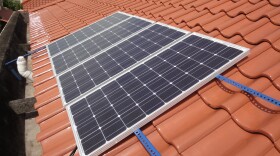The group that manages almost all of the Texas electric grid has decided it's a good idea to build out more transmission lines in West Texas. That in itself might not sound like a big deal, but the reason behind it is. KUT's Mose Buchele joins Morning Edition host Jennifer Stayton to explain.
_________________________________________________
Jennifer Stayton: So tell me what is this about.
Mose Buchele: Well, the Electric Reliability Council of Texas (ERCOT) has seen huge growth in electricity demand in West Texas. Peak demand increased nine-fold since 2010. And I'll give you a guess why.
Stayton: OK, if we're talking West Texas, we're talking electricity demand in West Texas. It's got to be oil, right?
Buchele: Yep, oil. You got it. Companies are still pumping a lot of oil out in West Texas. That takes a lot of electricity, but it's not just oil activity, using electricity in West Texas. ERCOT is also seeing more electricity generated out west. Here is Leslie Sopko, an ERCOT spokesperson.
"You know more than 1,600 megawatts of solar resources are expected to come online in Pecos and Southwest Upton counties between 2016 and 2020. So, a lot of solar growth opportunity in that area."
Buchele: Now keep in mind a megawatt can power up to 500 homes. So, you've got a lot of electricity use and a lot of potential solar power moving around the grid in West Texas.
"With that comes the potential for congestion on the transmission system. And so, that's why we're endorsing this project to basically add more transmission capability in that region."
Stayton: All right, so we've been talking about West Texas, Mose, but what does this mean for everybody? For the rest of Texas?
Buchele: Well, a lot of people wonder where the Texas oil business might be in two, three, 10 years from now. A lot of people wonder the same thing about solar power. What this means is that the people responsible for the electric grid at least they think both of those industries will probably be going strong.
Stayton: Well, we know you'll be covering that. Thanks, Mose.
Buchele: Thank you, Jennifer.
Correction: A previous version of this story incorrectly stated more than 16,000 megawatts of solar resources are expected to come online in two Texas counties by 2020. The correct figure is 1,600.




